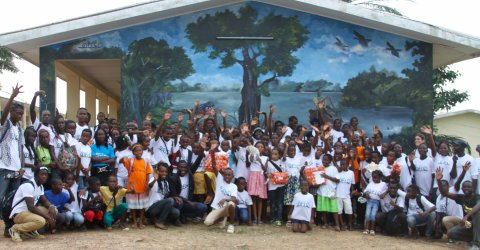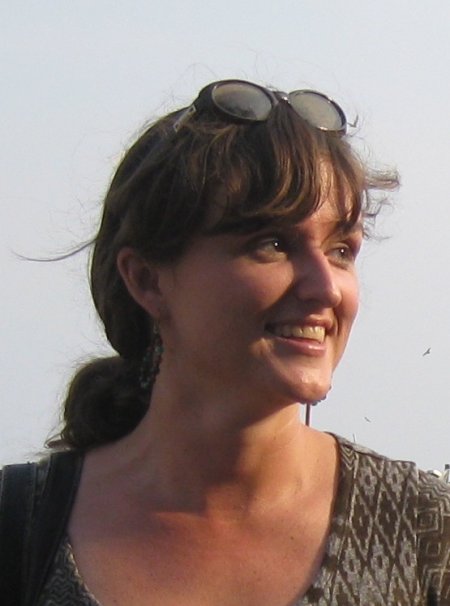
Tsam Tsam: Biodiversity conservation through ecotourism in the largest Ramsar Site of Gabon
Seven years ago on Christmas Day I travelled to the village of Tsam Tsam for the first time. I had been invited by Cyrille Mvele, who grew up fishing in the Ogooué River and the lakes of what is now the largest Ramsar Site in Gabon: the Bas Ogooué. He and others based on Lake Oguemoué wanted to start an ecotourism project that would protect the lake region for future generations. At the time, I was working on ecotourism and biodiversity conservation consulting projects around Africa, and had by chance crossed paths with Cyrille in Libreville. I agreed to visit their site to give some feedback, but had little idea that seven years later I would still be involved as the executive director of the biodiversity conservation NGO that the site inspired.
We began with a feasibility study and a small team of community members to brainstorm ideas. In 2011 we created a Gabonese registered non-profit organization: Organisation Ecotouristique du Lac Oguemoué (OELO). In 2013 we finished construction of the ecotourism site, Tsam Tsam, on a secluded peninsula a short boat ride away from its namesake village. Community members from local villages now work as guides and lead hikes with tourists through the surrounding forests to track wildlife, identify traditional plant uses and share their knowledge of the forest. They lead tourists on paddle trips in traditional dugout pirogues and visit lakeside villages to share local culture. All meals at Tsam Tsam are cooked by local women using traditional Gabonese recipes of vegetables and lake fish.
As Tsam Tsam began to grow, we interviewed lake residents to identify their environmental priorities. It was clear that overfishing was the predominant concern, as most residents are fishers and they had observed changes in the quality of lake fisheries over time. We created a sustainable fishing programme, and in partnership with The Nature Conservancy (TNC), helped fishers from eight villages to organize into two associations promoting sustainable practices. The associations are now collaborating with the Gabonese government to create the first freshwater fisheries management plan in the country. Using their knowledge of lake fisheries, Oguemoué fishers have proposed three protected areas on the lake as no-take zones for fish reproduction. With technical support from TNC and research partners, fishers are leading a participatory study on catch rates and fishing methods to monitor changes with time. In addition to sustainable fishing, OELO now leads programmes in ecotourism, environmental education, community outreach on protected species, and biodiversity research.
We have launched an environmental education programme in 17 local schools, so far reaching over 8,000 students and 100 teachers. In schools and religious institutions we have formed 12 youth nature clubs that lead stewardship projects in the Bas Ogooué Ramsar Site. Each club identifies an environmental problem (such as litter around their school or illegal bushmeat for sale at the nearby market), proposes a solution that they can implement over the year (neighborhood cleanups or outreach with vendors and restaurant owners) and then OELO and the teacher mentors help them to realize their stewardship project. At our annual World Environment Day events, the most active clubs are awarded field trips to Tsam Tsam and top students awarded environmental scholarships.
Our citizen science initiative “Projet Faux Gavial” gets children involved in the conservation of the critically endangered slender-snouted crocodile, by reporting observations of crocodile bushmeat being offered for sale. We have painted biodiversity murals, hosted community events, and worked with local leaders to enforce species protection laws. In 2017, in partnership with the Mayor’s office of Lambaréné (the largest city in the Bas Ogooué Ramsar Site), we are opening a community youth environmental centre. After five years of conducting market surveys to record changes in bushmeat availability and leading outreach efforts, we recorded an overall decline in bushmeat for sale of 70%, and by 2016 we had seen the first full year in which no fully protected species were on sale in the market of Lambaréné! What started as an idea by a handful of people from a small village is now a great partnership and a family of tourists, students, community leaders, conservationists, teachers, fishers, and the wider Bas Ogooué community. For more information and to visit Tsam Tsam please see our website: www.oelogabon.org .

By Heather Arrowood, Co-founder and Executive Director, OELO
Heather holds a BS in Wildlife Ecology from the University of Wisconsin, Madison and an MESc in Environmental Science from the Yale School of Forestry and Environmental Studies. She has worked as an ecotourism consultant on projects in Africa and the Caribbean, developing initiatives that protect the environment while also benefiting local people. From 2002-2004 she was a Peace Corps volunteer in northern Cameroon. Before working in Gabon, she consulted for the private sector with tour operators and lodges in East Africa to develop strategies for improving their sustainability, community outreach, conservation initiatives and interpretation for guests. Heather has also worked with expedition cruises, Travel Dynamic International and Lindblad’s National Geographic Explorer to reduce environmental footprints, design responsible excursion itineraries and lead tours in 16 countries along the coasts of West Africa.